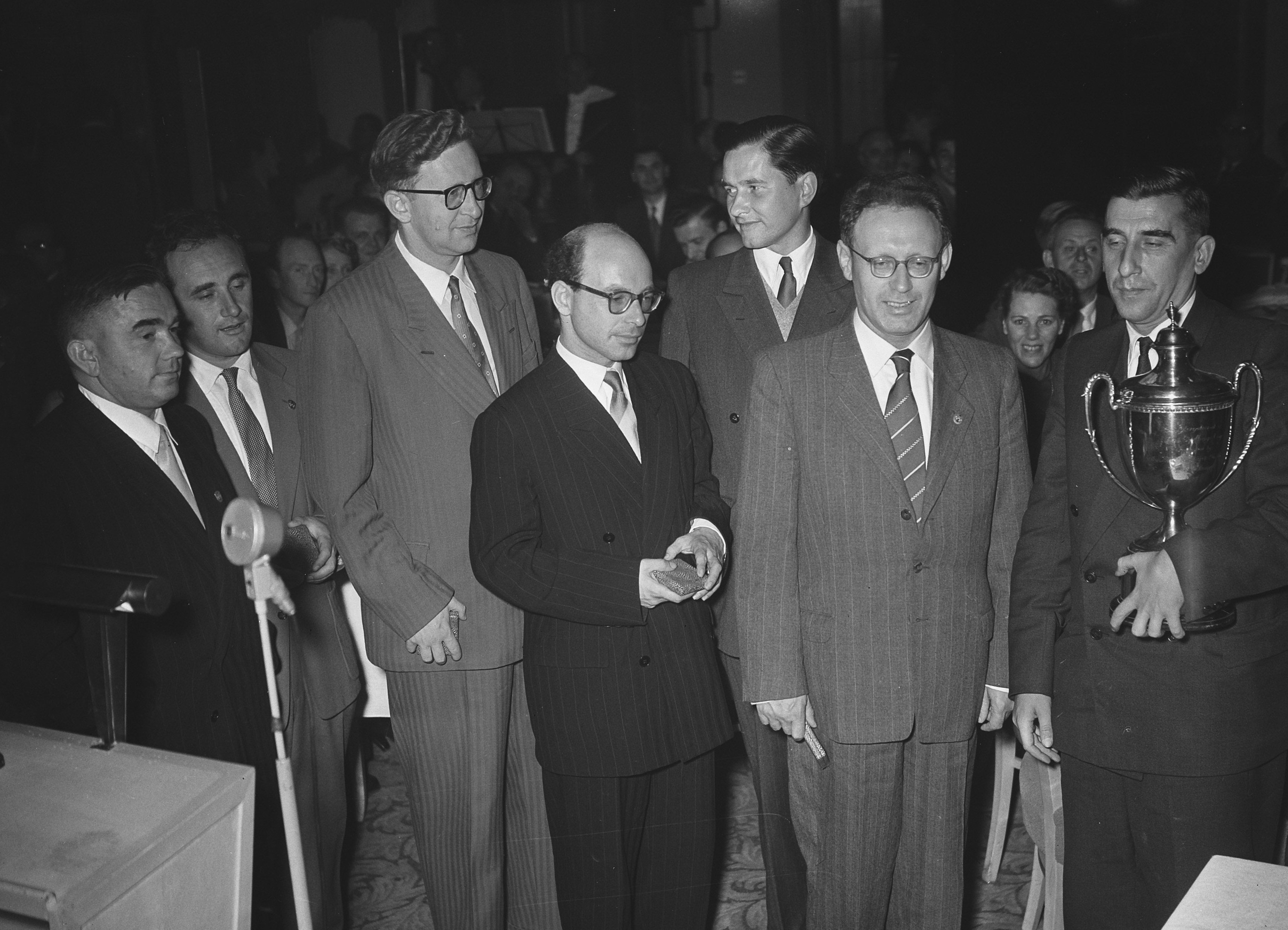11th Chess Olympiad on:
[Wikipedia]
[Google]
[Amazon]
The 11th

11th Chess Olympiad: Amsterdam 1954
OlimpBase {{Chess Olympiads 11 Olympiad 11 Chess Olympiad, 11th Olympiad 11 Chess Olympiad 11 September 1954 sports events in Europe 1950s in Amsterdam
Chess Olympiad
The Chess Olympiad is a biennial chess tournament in which teams representing nations of the world compete. FIDE organises the tournament and selects the host nation. Amidst the COVID-19 pandemic, FIDE held an Online Chess Olympiad in 2020 and ...
( nl, De 11e Schaakolympiade), organized by the FIDE
The International Chess Federation or World Chess Federation, commonly referred to by its French acronym FIDE ( Fédération Internationale des Échecs), is an international organization based in Switzerland that connects the various national c ...
and comprising an openAlthough commonly referred to as the ''men's division'', this section is open to both male and female players. team tournament, as well as several other events designed to promote the game of chess
Chess is a board game for two players, called White and Black, each controlling an army of chess pieces in their color, with the objective to checkmate the opponent's king. It is sometimes called international chess or Western chess to dist ...
, took place between September 4 and September 25, 1954, in Amsterdam
Amsterdam ( , , , lit. ''The Dam on the River Amstel'') is the Capital of the Netherlands, capital and Municipalities of the Netherlands, most populous city of the Netherlands, with The Hague being the seat of government. It has a population ...
, Netherlands.
30 teams had applied, but only 26 took part. The most notable absentees were the United States, who couldn't afford the travelling expenses due to financial difficulties in the USCF.
The Soviet team once again won the event, followed by Argentina and Yugoslavia. Unlike the previous Olympiad, however, they dominated this one completely and crushed all opposition, winning the final by an astounding seven points. Keres' amazing score of 96.4% was an all-time record; he drew his first game (against Nilsson of Sweden) and won the rest.
Results

Preliminaries
A total of 26 teams entered the competition and were divided into four preliminary groups of six or seven teams. The top three from each group advanced to Final A, and the rest to Final B. All groups and finals were played asround-robin tournament
A round-robin tournament (or all-go-away-tournament) is a competition in which each contestant meets every other participant, usually in turn.''Webster's Third New International Dictionary of the English Language, Unabridged'' (1971, G. & C. Me ...
s.
Group 1 was won by the Soviet Union, well ahead of the Dutch hosts and Iceland. Austria, Finland, and Greece finished in the bottom half.
Argentina took first place in group 2, ahead of Bulgaria and Czechoslovakia. Canada, Italy, and Ireland made up the rest of the group.
Group 3 was won by Israel, ahead of Yugoslavia and Sweden. Denmark, Norway, France, and Saar had to settle for a place in the consolation final.
Hungary clinched group 4, ahead of West Germany and England. Switzerland, Colombia, Belgium, and Luxembourg rounded up the group.
Group 1
Group 2
Group 3
Group 4
Final
: :Final A
Final B
Individual medals
* Board 1:Mikhail Botvinnik
Mikhail Moiseyevich Botvinnik, ( – May 5, 1995) was a Soviet and Russian chess grandmaster. The sixth World Chess Champion, he also worked as an electrical engineer and computer scientist and was a pioneer in computer chess.
Botvinn ...
8½ / 11 = 77.3%
* Board 2: Frank Anderson 14 / 17 = 82.4%
* Board 3: Gedeon Barcza 12½ / 16 = 78.1%
* Board 4: Paul Keres
Paul Keres (; 7 January 1916 – 5 June 1975) was an Estonian chess grandmaster and chess writer. He was among the world's top players from the mid-1930s to the mid-1960s, and narrowly missed a chance at a World Chess Championship match on fi ...
13½ / 14 = 96.4%
* 1st reserve: Efim Geller 5 / 7 = 71.4%
* 2nd reserve: Sylvain Burstein 8½ / 11 = 77.3%
Notes and references
External links
11th Chess Olympiad: Amsterdam 1954
OlimpBase {{Chess Olympiads 11 Olympiad 11 Chess Olympiad, 11th Olympiad 11 Chess Olympiad 11 September 1954 sports events in Europe 1950s in Amsterdam